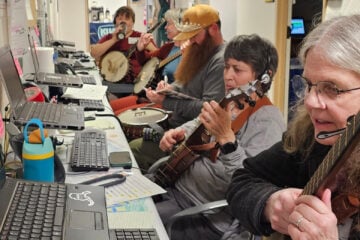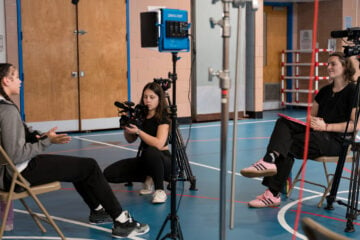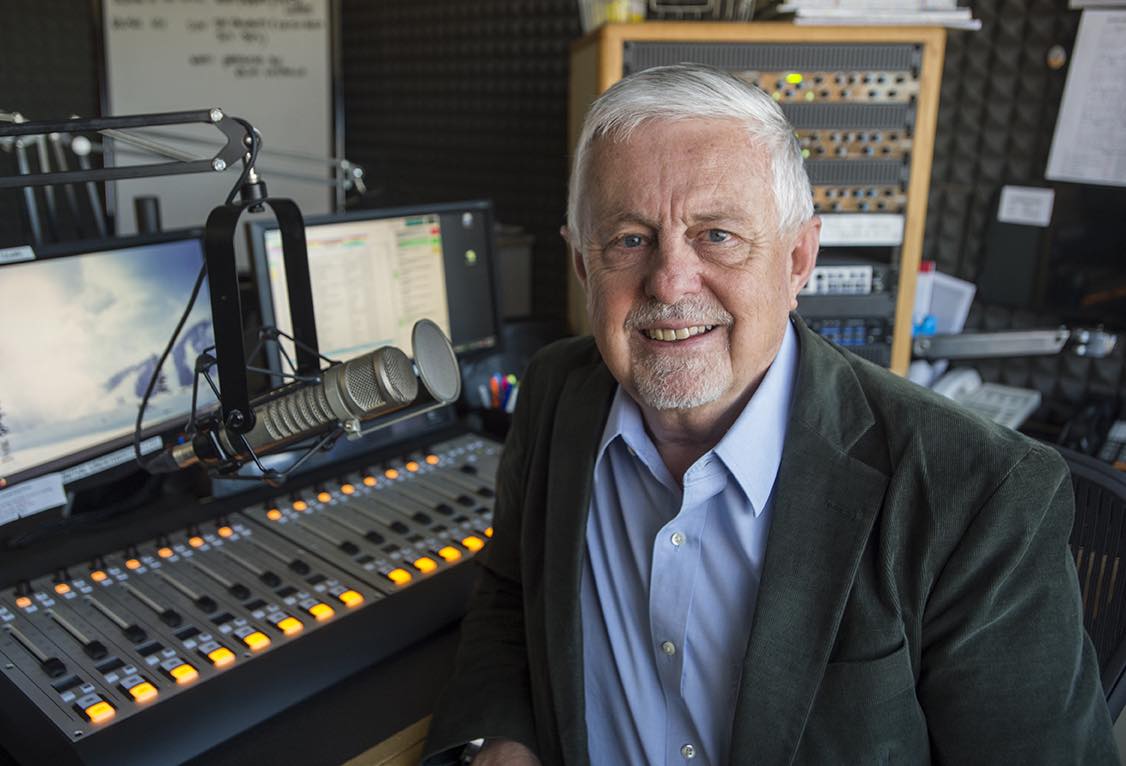Producer’s own mentor: first in a series
When filmmaker and anthropologist Elizabeth Kapu’uwailani Lindsey was 7 years old, her Native Hawaiian elders predicted she would “keep the voices of the ancestors alive.”
“I just naively thought every 7-year-old goes through that conversation,” she says.
As foretold, Lindsey has devoted much of her life to sustaining Pacific Islander traditions. She is an expert on the islanders’ traditional means of navigating the ocean without instruments, and she produced the 1996 PBS film Then There Were None, about the ongoing disappearance of Native Hawaiian people and culture, beginning with European arrival. Lindsey has also acted in dozens of TV programs and several movies, and she was Miss Hawaii in 1978.
Now, as a fellow at National Geographic, Lindsey is embarking on a vast project to collect elders’ knowledge from around the world — their methods of predicting future events, reconciling people in conflict, and understanding causes and effects of climate change.
She’ll refine the material into Passages, a four-part series slated for PBS distribution in 2010. When Lindsey is done, funders will probably have spent $3 million to $5 million on Passages, says Ruth Bolan, executive director of Pacific Islanders in Communication (PIC) and an e.p. for the series.
The task is urgent because so many Native elders are in their last years, Bolan says. In fact, Lindsey began work on Passages because her longtime mentor — Pius “Mau” Piailug, one of the world’s most revered noninstrument navigators — is dying of kidney failure.
Knowledge from a master navigator
In May 2006, Piailug asked Lindsey to come with her camera to Satawal, his tiny home island in Micronesia. They’d known each other since 1998, when Lindsey studied with him as part of her Ph.D. in anthropology, for which she specialized in ethnonavigation. “Of course, I said yes, because he’s my teacher, and he’s given me so much,” Lindsey says.
Nine months later, with funding from PIC and $200,000 of her own money, Lindsey and a five-person crew traveled to Satawal by ship from Guam. On board were 5,000 pounds of video gear, and food and medical supplies for the islanders. She planned to record an ancient initiation ceremony that only Piailug knew how to perform but didn’t know what else he would share. She expected her visit would provide material for a one-off documentary.
Some participants in the ceremony had begun studying with Piailug in the 1970s, when activists brought him to Hawaii to teach. Native Hawaiians had lost the art of noninstrument navigation, Bolan says, but Piailug and his students built a replica of a traditional Polynesian voyaging canoe and sailed from Honolulu to Tahiti. This success, Bolan says, brought a renaissance of traditional culture to Hawaii.
Piailug’s students promised they would someday build him his own canoe and bring it to him. In February 2007, they sailed it and the original 1970s vessel from Hawaii to Satawal, navigating by the shape and sequence of waves, the rising and setting of stars and the color of clouds, among other techniques.
Lindsey was there to film the canoes’ arrival.
In a traditional ceremony called Pwo, which continues several days, Piailug initiated navigation students from Hawaii and his island as “master navigators” and imparted secret knowledge, Lindsey says. The ceremony had not been performed since his forerunners initiated Piailug in the 1950s.

Piailug initiated his students as “master navigators” in a traditional ceremony last performed when he was initiated in the 1950s. (Photo: Elizabeth Lindsey.)
Lindsey and her crew spent a month on Satawal, recording and listening to Piailug and other elders. She carted the equipment around the mile-long island in a wheelbarrow and drew power, when needed, from generators and fuel she took along.
She brought rice to ease a food shortage triggered by climate change. The rising ocean has swallowed Satawal’s entire southern shore, and salty water has corrupted the roots of plants the islanders grow as staple foods.
The Satawalese may soon become “climate refugees” who can no longer live on their island. A United Nations study predicts as many as 50,000 people around the world will have to leave their homes by 2010, Lindsey says. She’s slated to address the U.N. General Assembly about the issue next week.
Western popular culture is also changing Satawal. As Piailug told her, “You see no children come to study with us — they don’t care.” Young people on the island increasingly flock to Western media, sometimes running DVD players on generator power even when there is a fuel shortage. Native traditions seem “a bit old and not sexy” to the young people, Lindsey says, and they’re not interested in learning about them.
The world needs this wisdom now, she believes. “The impetus of [Passages] is based on a Native prophesy that predicted the world would be in crisis at the turn of the new dawn, which we understand to be the 21st century,” she says. Worldwide economic fallout and environmental troubles confirm that a crisis is imminent if we don’t change the way we live, she says.
She says her elders always predicted the wisdom of elders from the far edges of the Earth would be needed to call the world into balance.
Beyond “sticking a flag”
In January, Lindsey became a National Geographic fellow—the first female given the title and the first Polynesian explorer to work with the organization. As experts in science, culture, education and public policy, fellows consult on NGS projects and work on their own research.
In her new position, Lindsey began to think about widening the scope of Passages to include elders worldwide. She now expects to discuss only a fraction of the traditional teachings in her film and store the rest in a public digital archive at the society. She also wants to donate DVDs and transcripts of her research findings to the archives of native communities to help them preserve their wisdom.
After discussing Passages with colleagues such as David Fanning, e.p. of Frontline, Lindsey decided to help non-Native viewers identify with the subject matter by adding some of their elders to her interview plans. An episode about the history and technique of navigation, for example, might pair Polynesian navigation skills with what NASA veterans learned about finding their way in space. To explore the concept of foretelling, Lindsey may interview the elders of the investment world about how they predict economic trends.
“We’re straddling an indigenous world . . . that is far more ancient in its traditions and practices than our audiences could perhaps understand,” Lindsey says.
National Geographic has since joined Lindsey’s project as co-producer of the series with PIC, and Lindsey will lead development of an archive that may become her lifelong project. In September, Passages got a $75,000 R&D grant from the CPB/PBS Program Challenge Fund. National Geographic’s specific contribution is currently being negotiated, Lindsey says, and all parties have agreed to fundraise together.
Lindsey is now researching where else she will visit elders; Cambodia, India and South America are all possibilities.
To have a Native person research indigenous knowledge and practices marks a new era for National Geographic. The society is trying to get away from the image of the white explorer “sticking a flag on something,” says Bolan.
The society’s magazine has told stories about Native peoples from a mostly Western, outsider’s perspective, and the organization’s scientists and explorers have taken objects from Native communities—objects they’ve now begun to repatriate.
Instead, Lindsey takes care to create a reciprocal relationship with the people she visits, spending time listening to them and taking them things they need, such as clothes and medical supplies. When she visited Satawal, her crew left behind generators and drums of fuel.
Before filming, she always discusses with elders what is appropriate to share publicly and makes sure there is a clear understanding of where the footage will appear. When she talked with the elders on Satawal, they told her “Share everything, because the world needs to know.”
To tell their story, Lindsey will draw on her experience straddling ancient and contemporary worlds and fusing traditional and Western knowledge. During her Ph.D. studies at the Cincinnati-based Union Institute & University, she wouldn’t write down some of what Piailug taught her because it had to remain confidential. Her non-Native graduate advisors had a hard time accepting this, and she almost left the program, she says.
Piailug asked her why she needed the diploma. She explained that it would give her authority to explain aspects of navigation and indigenous science to people. Such as: when Piailug lies in a canoe’s hull, he’s not just an old man relaxing. He’s actually gathering empirical data, though he wouldn’t call it that. Lying in the “womb” of the boat, he can feel the dominant swell and angle of the waves.
Yet Lindsey doesn’t want to appear in Passages as some expert who visits an unfamiliar culture and shows viewers what’s there. Instead, she wants viewers to feel as if they are students sitting and learning in an intimate circle.
One message they’ll hear repeatedly, as Lindsey has, is that humans have forgotten our place in the world. “The world is getting sick,” say the elders, “and we are not caring for her properly.”






